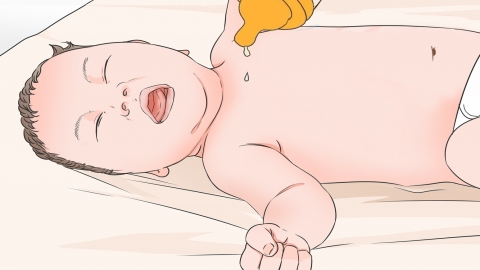What should I do if a one-year-old baby has phlegm in the throat causing a wheezing sound?
Generally, a one-year-old baby having phlegm sounds in the throat may be caused by laryngeal cartilage dysplasia, saliva accumulation, allergic rhinitis, bronchitis, pneumonia, etc. Treatment can be achieved through general care and medication under a doctor's guidance. If discomfort occurs, prompt medical attention is recommended. Detailed analysis is as follows:

1. Laryngeal Cartilage Dysplasia
During infancy, especially in newborns and premature infants, the laryngeal cartilage may not be fully developed, resulting in relatively soft laryngeal structures. When breathing, airflow passing through these soft tissues may cause vibrations, producing phlegm-like sounds. Ensure the baby receives adequate nutrition and appropriate sun exposure to promote vitamin D synthesis.
2. Saliva Accumulation
Infants have shallow oral cavities and underdeveloped swallowing functions. When saliva secretion is high, it can easily accumulate in the throat, producing sounds similar to phlegm. Parents should monitor the infant's saliva production and gently wipe away excess saliva using clean soft cloths or tissues to prevent accumulation. Additionally, slightly elevating the infant's head may help reduce the chance of saliva flowing into the throat.
3. Allergic Rhinitis
Allergic rhinitis may be triggered by genetic factors, exposure to allergens, food allergens, environmental factors, or air pollutants. Allergic reactions increase nasal secretions, leading to postnasal drip that irritates the throat, causing itching and coughing. Symptoms may include nasal congestion, runny nose, sneezing, and skin itching. It is recommended to use medications such as Loratadine Syrup, Budesonide Nasal Spray, or Cetirizine Hydrochloride Syrup under medical guidance.
4. Bronchitis
Bronchitis is often caused by infections with microorganisms such as viruses, bacteria, or mycoplasma, or may result from physical or chemical irritants. Inflammation of the bronchial mucosa causes congestion, swelling, and increased secretions, leading to thick phlegm that is difficult to cough out, resulting in phlegm sounds in the throat. Symptoms may include coughing, wheezing, and fever. Treatment may involve medications such as Cefixime Granules, Salbutamol雾化吸入溶液 (nebulization solution), or Ambroxol Hydrochloride Oral Solution, following a doctor's instructions.
5. Pneumonia
Pneumonia is usually caused by infection with microorganisms such as bacteria, viruses, or mycoplasma, or may be triggered by aspiration of foreign substances or immune factors. Lung infection leads to inflammation of the alveoli and lung interstitial tissue, increased secretions, and thick phlegm that is difficult to expel, resulting in phlegm sounds in the throat. Symptoms may include high fever and coughing. Treatment may involve medications such as Azithromycin Dry Suspension, Oseltamivir Granules, or Pulike Mixture under medical supervision.
It is recommended to regularly open windows for ventilation to maintain fresh indoor air and reduce the growth of viruses and bacteria. Appropriate outdoor activities and sun exposure can also help enhance the baby's physical condition and immunity.




